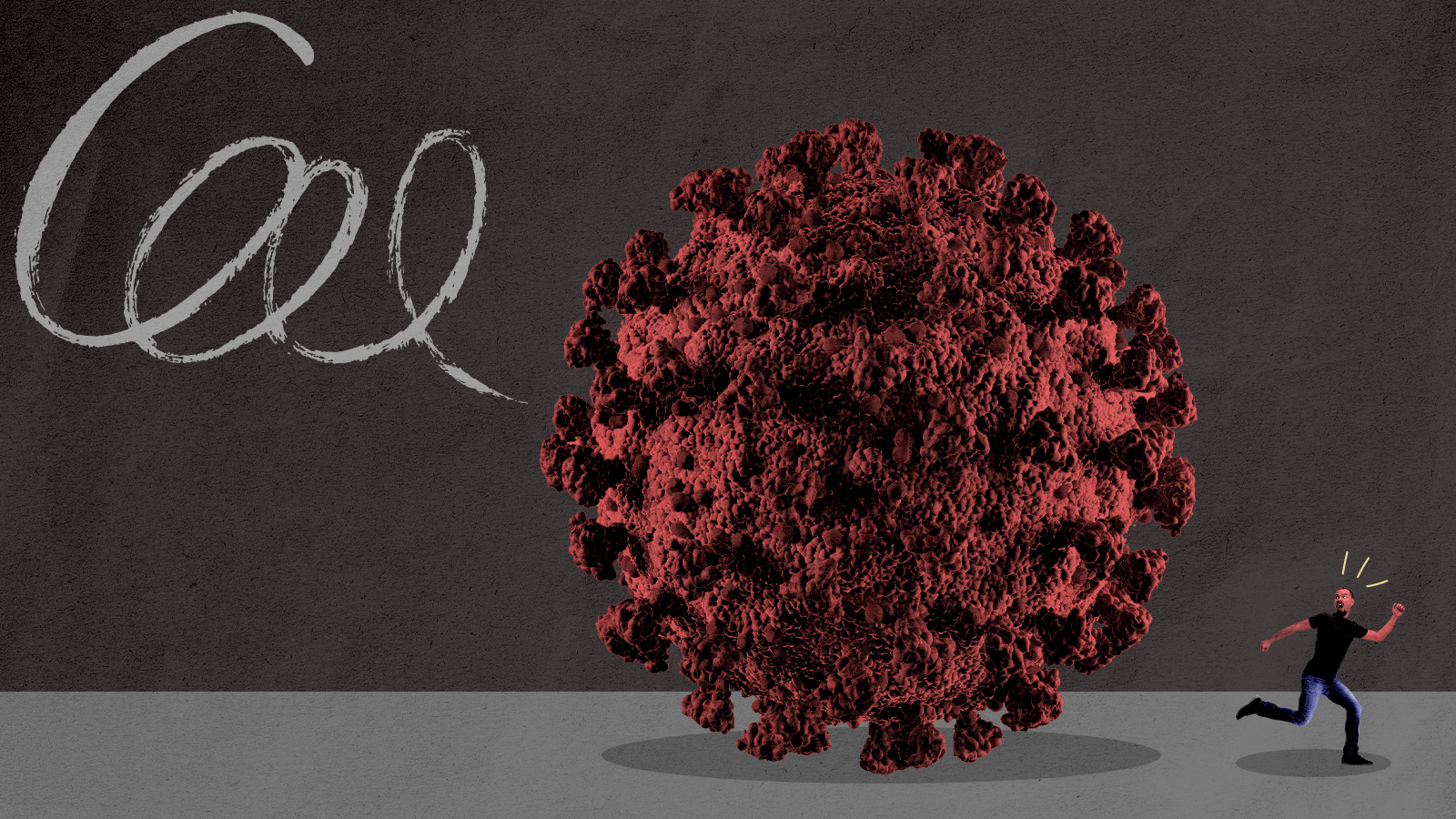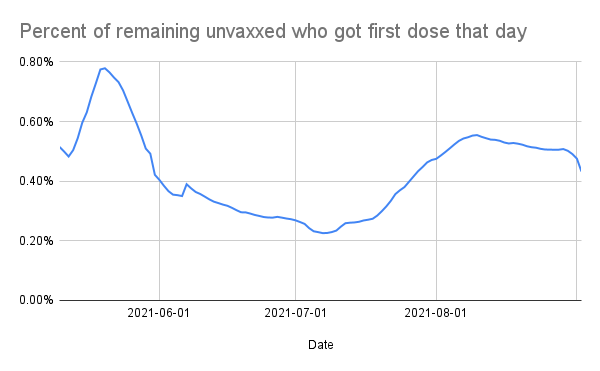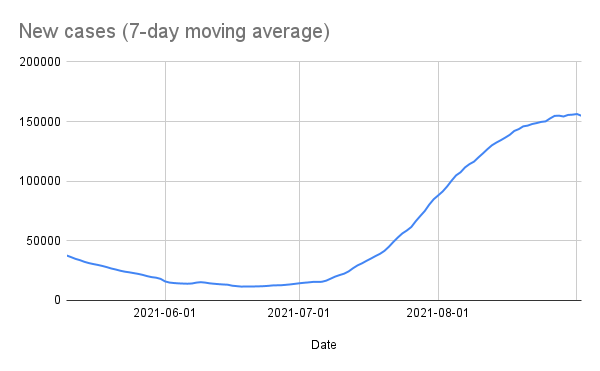What actually convinces people to get vaccinated? Fear.
The numbers suggest "death shaming" news coverage works


A free daily email with the biggest news stories of the day – and the best features from TheWeek.com
You are now subscribed
Your newsletter sign-up was successful
The main reason people get vaccines is fear. They are afraid of how a disease would negatively impact them, their family, or their community, so they want protection against it. People get vaccinated when they fear the disease more than the vaccine.
While it is not a pleasant way to persuade people of anything, fear has almost always been a very effective persuasion tool. Yet some writers like The Atlantic's Elizabeth Bruenig tell the media to "Stop Death Shaming" the unvaccinated when they die of COVID-19. Bruenig claims that if we want to persuade people to get vaccinated against COVID, highlighting individual stories of people suffering horrible deaths as a result of not taking the vaccine and being filled with regret in their dying moment is not a good idea. However, the data would imply this thinking is simply wrong.
The vaccination trends paint a pretty picture. The less the unvaccinated heard about COVID deaths and cases, and the negative consequences of getting the disease, the less likely they were to get vaccinated. When news stories of rising cases, horrible deaths, and the Delta variant were featured more prominently, you saw more people getting the vaccine. Compare these two charts.
The Week
Escape your echo chamber. Get the facts behind the news, plus analysis from multiple perspectives.

Sign up for The Week's Free Newsletters
From our morning news briefing to a weekly Good News Newsletter, get the best of The Week delivered directly to your inbox.
From our morning news briefing to a weekly Good News Newsletter, get the best of The Week delivered directly to your inbox.
This first chart, made with data from the CDC COVID Data Tracker, shows what percent of eligible people who are still unvaccinated get a vaccine each day based on a 7-day average, which makes the trend very clear. The chart starts when the FDA approves the vaccine for ages 12-15. There is a big increase followed by a slow, steady decline until early July, when the number of newly vaccinated as both a raw number and a percentage of those who needed to be reached started going back up.

As the second chart shows, this increase began right after new cases started rising and, as Google Trends suggest, people and news outlets started paying way more attention to COVID again.

The numbers suggest that the FDA fully approving the Pfizer-BioNTech vaccine on August 23 did not make a significant difference. On the other hand, awareness of the deadly threat — increased at least in part by the "death shaming" of unvaccinated individuals dying from COVID and alarming stories of illness — seems to actually work at convincing people to get vaccinated.
According to polling by KFF, 53% of the unvaccinated think the vaccine is a bigger risk to their health than getting COVID. That number is 75% among those who claim they will definitely never get the vaccine.
A free daily email with the biggest news stories of the day – and the best features from TheWeek.com
As long as many unvaccinated people are more afraid of the vaccine than the disease — whether due worries about side effects, fear of needles, conspiracies about microchips, delusions that COVID is a hoax, or an over-confident trust in their own immune system — they aren't getting vaccinated. Convincing people the vaccine is safe helps address one side of this mental equation, but stories that highlight how horrible death by COVID can be are also an effective way to change the calculation.
Jon Walker is the author of After Legalization: Understanding the Future of Marijuana Policy. He is a freelance reporter and policy analyst that focuses on health care, drug policy, and politics.
-
 The UK expands its Hong Kong visa scheme
The UK expands its Hong Kong visa schemeThe Explainer Around 26,000 additional arrivals expected in the UK as government widens eligibility in response to crackdown on rights in former colony
-
 One great cookbook: Joshua McFadden’s ‘Six Seasons of Pasta’
One great cookbook: Joshua McFadden’s ‘Six Seasons of Pasta’the week recommends The pasta you know and love. But ever so much better.
-
 Scientists are worried about amoebas
Scientists are worried about amoebasUnder the radar Small and very mighty
-
 A Nipah virus outbreak in India has brought back Covid-era surveillance
A Nipah virus outbreak in India has brought back Covid-era surveillanceUnder the radar The disease can spread through animals and humans
-
 Covid-19 mRNA vaccines could help fight cancer
Covid-19 mRNA vaccines could help fight cancerUnder the radar They boost the immune system
-
 The new Stratus Covid strain – and why it’s on the rise
The new Stratus Covid strain – and why it’s on the riseThe Explainer ‘No evidence’ new variant is more dangerous or that vaccines won’t work against it, say UK health experts
-
 RFK Jr. vaccine panel advises restricting MMRV shot
RFK Jr. vaccine panel advises restricting MMRV shotSpeed Read The committee voted to restrict access to a childhood vaccine against chickenpox
-
 RFK Jr. scraps Covid shots for pregnant women, kids
RFK Jr. scraps Covid shots for pregnant women, kidsSpeed Read The Health Secretary announced a policy change without informing CDC officials
-
 New FDA chiefs limit Covid-19 shots to elderly, sick
New FDA chiefs limit Covid-19 shots to elderly, sickspeed read The FDA set stricter approval standards for booster shots
-
 RFK Jr.: A new plan for sabotaging vaccines
RFK Jr.: A new plan for sabotaging vaccinesFeature The Health Secretary announced changes to vaccine testing and asks Americans to 'do your own research'
-
 Five years on: How Covid changed everything
Five years on: How Covid changed everythingFeature We seem to have collectively forgotten Covid’s horrors, but they have completely reshaped politics
